Yamaha MG16 Mixing Console
Road Tough. Studio Ready.
For more than a century, Yamaha has been building a legacy of superior craftsmanship and innovation exemplified in all of our products, from an unrivalled catalog of world-class musical instruments to touring-grade professional audio. Now in its third incarnation, the MG Series embodies this pursuit of design excellence, and incorporates some of the same technologies developed for use in high-end professional consoles, including studio-quality preamps, powerful digital processing, and a rugged, reliable construction.
With an intuitive, easy-to-use interface, the MG Series boasts an extensive lineup of compact mixing consoles with models ranging from six to twenty channels, suitable for a diverse range of users and applications. For installed, recording, or live music settings, the solid construction and flexible design of these consoles lets you shape your sound with confidence, continually delivering peak performance and a level of sound quality and reliability unrivalled in its class.
16-Channel Mixing Console: Max. 10 Mic / 16 Line Inputs (8 mono + 4 stereo) / 4 GROUP Buses + 1 Stereo Bus / 4 AUX
- 16-Channel Mixing Console
- Max. 10 Mic / 16 Line Inputs (8 mono + 4 stereo)
- 4 GROUP Buses + 1 Stereo Bus
- 4 AUX
- “D-PRE” mic preamps with an inverted Darlington circuit
- 1-Knob compressors
- PAD switch on mono inputs
- +48V phantom power
- XLR balanced outputs
- Internal universal power supply for world-wide use
- Rack Mount Kit Included
- Metal chassis
- 444 mm x 130 mm x 500 mm (17.5" x 5.1" x 19.7")
- 6.6 kg (14.6 lbs.)
Head of the class
Yamaha has always strived to provide sound engineers with the purest possible signal instead of added processing or color to give it a "signature" sound, and the MG Series is no exception. Embracing this philosophy of transparent sound, these mixing consoles deliver a level of sonic purity and sound quality that is unmatched in their class.

D-PRE (Discrete Class-A Mic Preamps)
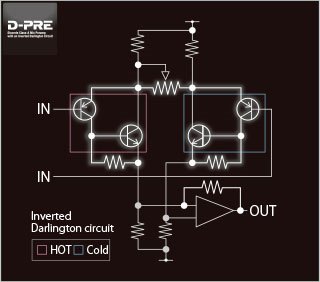
This is where it all starts. Everything you do as a sound engineer is dependent on the quality of your preamps, which determines the direction your mix will take, and ultimately how good it is going to sound. MG Series mixing consoles feature Yamaha's studio-grade discrete class-A D-PRE preamps, which utilize an inverted Darlington circuit comprising two cascading transistors in a configuration that provides more power with lower impedance. Delivering fat, natural sounding bass and smooth, soaring highs, with very low distortion, D-PRE preamps possess an impressively wide frequency range that allow them to handle signal from any audio source without overly amplifying any specific elements of the sound. Having such a pure sonic platform to build on will ultimately save you time and effort by eliminating the need for excessive EQing or additional effects processing in order to "fix" your mix.
High Quality Sound Op-amp
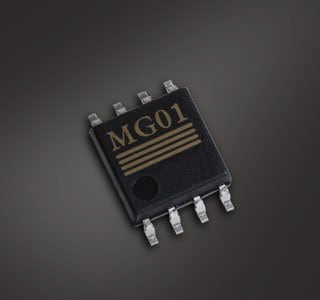
The head amp determines sound quality, and op-amp integrated circuits are one of the most important parts in the head amp circuit. MG Series mixers feature new, high-quality, custommade MG01 op-amps that we developed in cooperation with the semiconductor manufacturer. Although many other Op-amps prioritize electrical design and efficiency, we worked directly with the semiconductor manufacturer to focus on sound quality first. MG01 op-amps feature redesigned circuitry in which even the internal components and wiring have been optimized, and use materials such as high-quality silicon wafers and copper wire to achieve superb resolution.
Switchable Phantom Power & PAD Switch
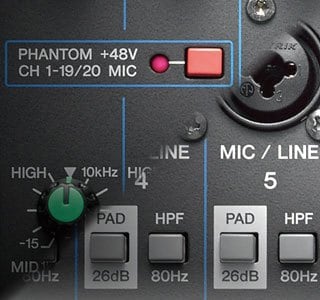
With phantom power, MG Series consoles allow you to take full advantage of the greater frequency response and high sound quality of condenser microphones. The input channel with PAD switch accepts MIC to line level of inputs, PAD Switch attenuates high input signals that often accompany mic'ed instruments during performance, avoiding the clippingthat can seriously affect your mix.
Our mixer. Your sound.
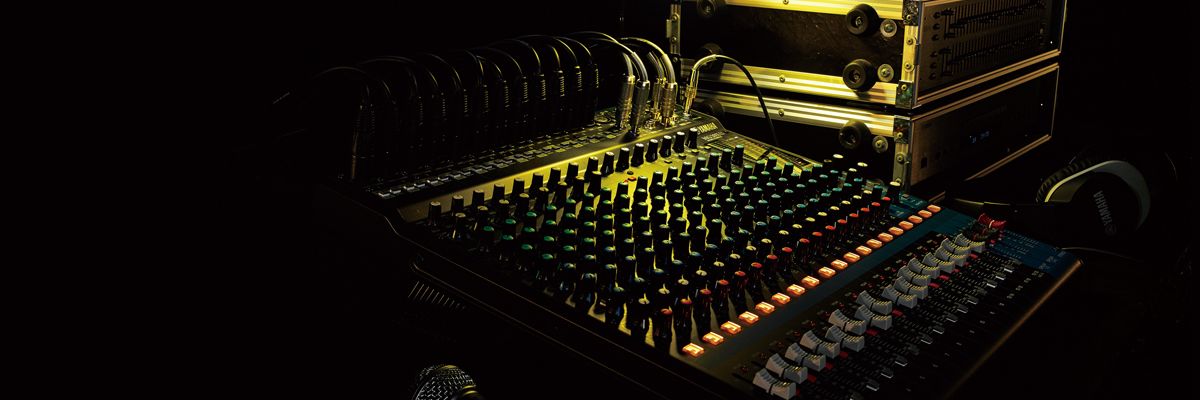
When was the last time you heard guitar without EQ or a completely unprocessed vocal on one of your favorite songs? Probably never. Yamaha mixers are famous for their flat response and sonic purity, but it often takes more than a perfectly-captured instrumental performance or vocal to achieve a professional-sounding mix. Equipped with some of the same state-of-the-art functionality featured on Yamaha’s high-end consoles, the MG Series gives you the tools you need to produce high quality sound that is uniquely your own.
1-knob Compressors
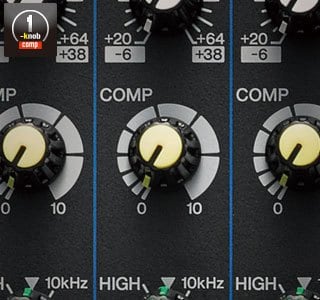
Compression plays an essential role in just about any recording or sound reinforcement environment by altering the level of dynamics of an audio signal when you need livelier guitars, punchier bass lines, a tighter snare, or a cleaner vocal sound. However, it can take countless hours to master the complexities of even the most basic outboard compression units and use them effectively. Originally a Yamaha innovation, 1-knob compressors are now an industry standard that gives you instant access to optimized compression settings via a single rotary control.
(except for MG06 / 06X)
EQ and High-pass Filters
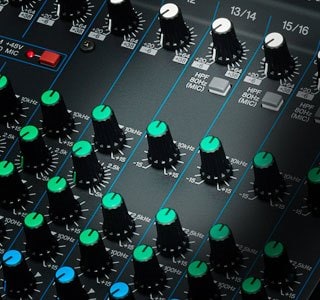
There's nothing more useful than reliable equalization when you need nuanced management of your tone. The MG Series benefits from Yamaha's unparalleled experience in designing pro audio gear, featuring 3-band equalizers on all mono channels for precise control of your sound. High-pass filter allows you to eliminate unwanted low-frequency noise, for a smoother, cleaner mix.
* MG06 / 06X feature 2-band equalizers on all mono channels.
AUX / Effect Sends / Group
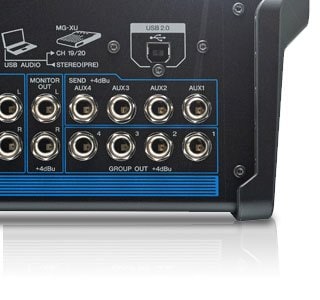
MG Series mixers feature up to AUX sends for expanding your sound reinforcement or recording setup, allowing you to incorporate additional effects, output to external recording devices, or feed to an monitoring system. (except for MG06 / 06X) Master send controls are also provided. The MG06 / 06X, MG10 / 10XU / 10XUF and MG12XUK have a single stereo bus. All other models additionally feature one or two stereo group buses and outputs that can be used for convenient channel grouping. Assign switches for the stereo and group buses are located next to each channel fader.
A variety of input / output connectors
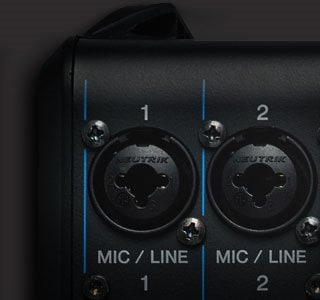
All models feature high-quality Neutrik™ balanced XLR connectors on mono microphone/line channels and XLR equipped stereo channels. Each of the mono inputs is equipped with combo jack and accepts both MIC and LINE level signals. Two of the stereo inputs are equipped with XLR and two phone connectors with XLR accepting MIC level signals while two phone connectors accepting LINE level signals and can be used either mono or stereo. (except for MG10 / 10XU / 10XUF / 12XUK) The function of another two stereo channel vary depending on model: With MG20 / 20XU, XLR accepts MIC level signal and two RCA connectors accepts LINE level signals and can be used either mono or stereo. With MG12 / 12XU and MG16 / 16XU, two phone connectors accept LINE level signals as stereo. Additionally, each of the stereo channel features 2TR in (RCA connectors) and can be used as independent input from external audio sources such as CDs. MG10 / 10XU / 10XUF and MG12XUK are equipped with additional stereo channel with a pair of phone jack that accepts LINE levels. With XU models, any incoming source that are sent via USB can be assigned to one of the stereo channel. In addition to the main stereo outputs (XLR L/R, TRS phone L/R), MG Series mixing consoles are equipped with a comprehensive suite of output connectors, including GROUP OUT (TRS phone), AUX/FX OUT (TRS phone), MONITOR OUT (TRS phone L/R), and HEADPHONE OUT (stereo phone) connectors, allowing master outputs to be chosen to suit specific applications such as monitoring or mastering.
LED level metering
Easy-to-read LED level metering allows output levels to be monitored with precision.
Built-in SPX Digital Effects
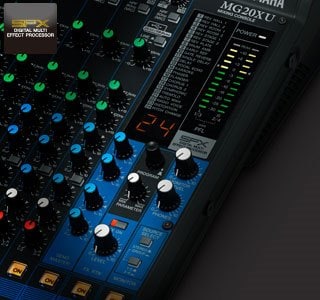
For musical and non-musical applications alike, effects processing adds polish and professionalism to the mix. The MG X / XU models features Yamaha’s acclaimed SPX digital multi-effect processor, offering a comprehensive suite of 24 editable digital effects perfect for enhancing your mix, whether adding depth to a speaking engagement or breathing new color and atmosphere into a live band performance. In particular, the high-quality reverb and delay expand the spatial quality of the sound with remarkable realism and naturalness. You can even connect an optional FC5 foot switch for effect on / off control. (MG10XU / 10XUF / 12XU / 12XUK / 16XU / 20XU)
* MG06X features six SPX effects (REVERB HALL / ROOM / PLATE, DELAY SHORT / LONG / VO.ECHO), which are not editable.
Built to last

For gigging, recording, and installed applications alike, your console can be subjected to a wide range of environmental conditions and hazards. Excessive humidity, unstable power supplies, and the rigors of road travel in general can take a serious toll on a mixing console, often causing expensive, time-consuming repairs, and reducing its lifespan. The MG Series has been redesigned with an emphasis on durability, incorporating practical features that offer greater flexibility while ensuring peak performance for many years to come.
Metal Chassis
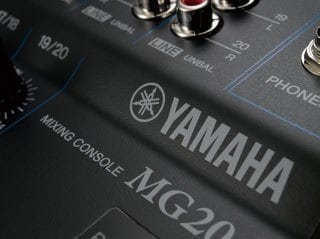
Built to last, MG Series mixers feature a rugged, impact-resistant, powder-coated metal chassis, offering an unrivalled level of durability. With a sleek design contoured for optimal convection cooling, the internal layout separates the power supply from the analog circuitry for superior noise reduction, and further extends the life of the components inside. To further ensure reliable performance, knob control placement above the surface of the chassis diverts any impact or pressure on the knobs to the chassis itself and not the circuit board or components underneath.
Internal Universal Power Supply
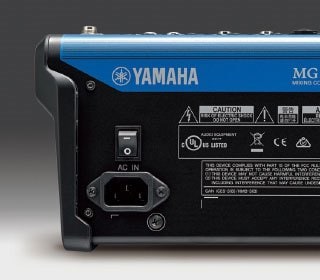
Thanks to a highly-efficient internal universal power supply, MG Series consoles offer worry-free operation in any region around the globe—even in environments prone to potentially damaging power fluctuations. An internal power supply also simplifies rack mounting of the console for installed applications, eliminating the need for a bulky adapter or additional connections.(* MG12 / 16 / 20 / 12XU / 16XU / 20XU)
Rack Mount Kit Included
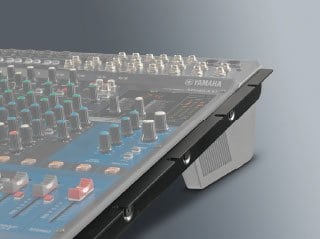
Easily adaptable to a diverse range of installed and portable applications, the 16- and 20- channel models of the MG Series included rack ears, giving you the option of a rack-mounted or desk-top configuration. Extremely durable, their sleek design makes safe, stable placement of your console hassle-free, keeping setup time and effort to a minimum. (MG16 / 20 / 16XU / 20XU)
- Optional Rackmount kit "RK-MG12" available for MG12 / MG12XU.
- Optional Mic stand Adapter "BMS10-A" available for MG06 / 06X / 10 / 10XU.
XLR connector
The main stereo outputs feature XLR type connectors that lock to prevent accidental disconnection. Rugged and dependable, these professional connectors ensure providing stable signal transmission even in the most demanding environments.
Create, record… listen
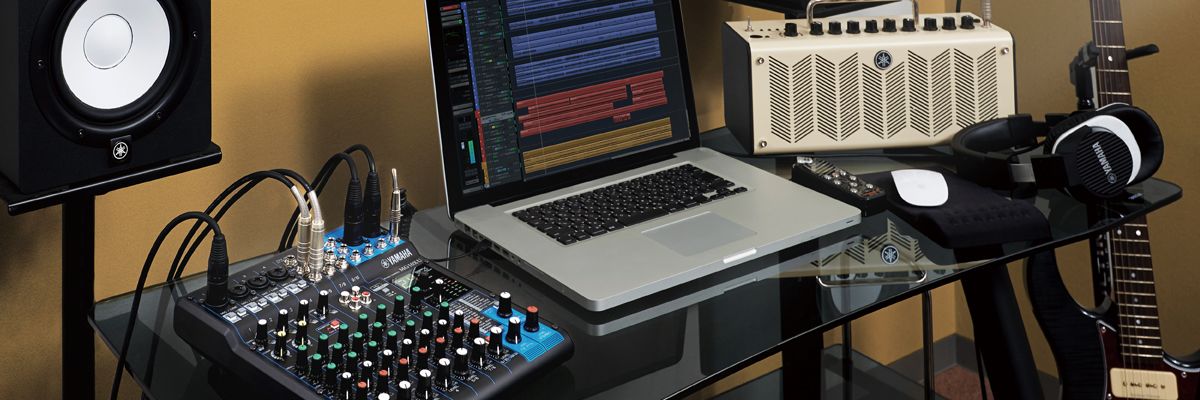
The MG XU models feature the same digital connectivity that is used to streamline the recording process on Yamaha’s professional-level mixing consoles. Take advantage of state-of-the-art digital technology that makes it easier than ever to plug-in, play, record, and then listen to your creations.
24-bit /192kHz 2-in/2-out USB Audio Interface Function
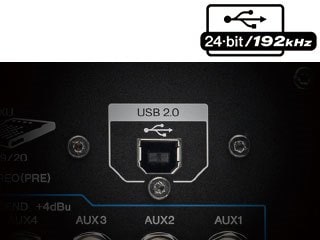
The MG XU models feature flexible digital connectivity for quick and easy highresolution playback of digital content. Simply connect to your PC via USB, or to your iPhone / iPad (2 or later) using Apple’s Camera Connection Kit / Lightning to USB Camera Adapter. The USB protocol uses asynchronous data transfer. Audio data is transferred based on highly precise audio clock signal from the MG, for high quality recording and playback.
(MG10XU / 10XUF / 12XU / 12XUK / 16XU / 20XU)
MG Rec & Play

The MG Rec & Play software application enables high-quality recording, as well as fast and easy playback of songs and sound effects, by simply connecting your iPhone/iPad to any MG Series XU model. This intuitive application can be used for a wide range of purposes such as recording songwriting sessions, band rehearsals, and live gigs, or providing background music or sound effects for live concert or entertainment events, or parties. (MG10XU / 10XUF / 12XU / 12XUK / 16XU / 20XU)
*Apple iPad Camera Connection Kit/ Lightning to USB Camera Adapter required.
Cubase AI
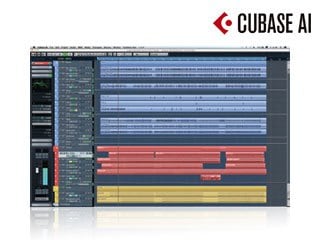
MG XU models are bundled with Downloadable Steinberg’s Cubase AI software. As one of the most advanced, comprehensive DAW suites available, Steinberg's Cubase has led the charge, providing users with a powerful and flexible platform for music production. Cubase AI offers these same core technologies and interface that have won Cubase worldwide acclaim. (MG10XU / 10XUF / 12XU / 12XUK / 16XU / 20XU)
Cubasis LE

“Cubasis LE” is available in the App Store. You just need to connect your iPad to MG XU models to make it work. Cubasis LE is the compact version of Steinberg’s streamlined, multitouch sequencer for the iPad, providing the same look and feel of its bigger brother Cubasis. Specially designed for quick and easy operation, Cubasis LE makes recording, editing and mixing a breeze. Cubasis LE places touch-intuitive production tools in your hands, opening a new world of possibilities for your creativity. (MG10XU / 10XUF / 12XU / 12XUK / 16XU / 20XU)
*Apple iPad Camera Connection Kit/ Lightning to USB Camera Adapter required.
MG Series (Standard Model) Specifications
|
|
MG20 |
MG16 |
MG12 |
MG10 |
MG06 |
|
|---|---|---|---|---|---|---|
| I/O | Phantom power | +48V | +48 V | +48 V | +48 V | +48 V |
| Input Channels | Mono[MIC/LINE] | 12 | 8 | 4 | 4 | 2 |
| Mono/Stereo[MIC/LINE] | 4 | 2 | 2 | - | - | |
| Stereo[LINE] | - | 2 | 2 | 3 | 2 | |
| Output Channels | STEREO OUT | 2 | 2 | 2 | 2 | 2 |
| MONITOR OUT | 1 | 1 | 1 | 1 | - | |
| PHONES | 1 | 1 | 1 | 1 | 1 | |
| AUX SEND | 4 | 4 | 2 | 1 | - | |
| GROUP OUT | 4 | 4 | 2 | - | - | |
| Bus | Stereo: 1, GROUP: 4, AUX: 4 | Stereo: 1, GROUP: 4, AUX: 4 | Stereo: 1, GROUP: 2, AUX: 2 | Stereo: 1, AUX: 1 | Stereo: 1 | |
| Input Channel Function | PAD | 26 dB(Mono) | 26 dB (Mono) | 26 dB (Mono) | 26 dB (Mono) | 26 dB (Mono) |
| HPF | 80 Hz, 12 dB/oct (Mono/Stereo: MIC only) | 80 Hz, 12 dB/oct (Mono/Stereo: MIC only) | 80 Hz, 12 dB/oct (Mono/Stereo: MIC only) | 80 Hz, 12 dB/oct (Mono) | 80 Hz, 12 dB/oct (Mono) | |
| COMP | 1-knob compressor (Gain/Threshold/Ratio) Threshold: +22 dBu to -8 dBu, Ratio: 1:1 to 4:1, Output level: 0 dB to 7 dB Attack time: approx. 25 msec, Release time: approx. 300 msec | 1-knob compressor (Gain/Threshold/Ratio) Threshold: +22 dBu to -8 dBu, Ratio: 1:1 to 4:1, Output level: 0 dB to 7 dB Attack time: approx. 25 msec, Release time: approx. 300 msec | 1-knob compressor (Gain/Threshold/Ratio) Threshold: +22 dBu to -8 dBu, Ratio: 1:1 to 4:1, Output level: 0 dB to 7 dB Attack time: approx. 25 msec, Release time: approx. 300 msec | 1-knob compressor Threshold: +22 dBu to -8 dBu, Ratio: 1:1 to 4:1, Output level: 0 dB to 7 dB, Attack time: approx. 25 msec, Release time: approx. 300 msec | - | |
| EQ HIGH | Gain: +15 dB/-15 dB, Frequency: 10 kHz shelving | Gain: +15 dB/-15 dB, Frequency: 10 kHz shelving | Gain: +15 dB/-15 dB, Frequency: 10 kHz shelving | Gain: +15 dB/-15 dB, Frequency: 10 kHz shelving | (Mono) Gain: +15 dB/-15 dB, Frequency: 10 kHz shelving | |
| EQ MID | Gain: +15 dB/-15 dB, Frequency: Mono 250 Hz – 5 kHz peaking, Stereo 2.5 kHz peaking | Gain: +15 dB/-15 dB, Frequency: Mono 250 Hz – 5 kHz peaking | Gain: +15 dB/-15 dB, Frequency: 2.5 kHz peaking | Gain: +15 dB/-15 dB, Frequency: 2.5kHz peaking | - | |
| EQ LOW | Gain: +15 dB/-15 dB, Frequency: 100 Hz shelving | Gain: +15 dB/-15 dB, Frequency: 100 Hz shelving | Gain: +15 dB/-15 dB, Frequency: 100 Hz shelving | Gain: +15 dB/-15 dB, Frequency: 100 Hz shelving | (Mono) Gain: +15 dB/-15 dB, Frequency: 100 Hz shelving | |
| PEAK LED | LED turns on when post EQ signal reaches 3 dB below clipping(Mono) | LED turns on when post EQ signal reaches 3 dB below clipping | LED turns on when post EQ signal reaches 3 dB below clipping | LED turns on when post EQ signal reaches 3 dB below clipping | LED turns on when post EQ signal reaches 3 dB below clipping | |
| Level Meter | 2x12 -segment LED meter [PEAK, +10, +6, +3, 0, -3, -6, -10, -15, -20, -25, -30 dB] | - | 2x12 -segment LED meter [PEAK, +10, +6, +3, 0, -3, -6, -10, -15, -20, -25, -30 dB] | 2 x 7 -segment LED meter [PEAK, +10, +6, 0, -6, -10, -20 dB] | 2 x 7 -segment LED meter [PEAK, +6, +3, 0, -3, -10, -20 dB] | |
| Total harmonic distortion | 0.03 % @ +14dBu (20 Hz to 20kHz), GAIN knob: Min, 0.005 % @ +24dBu (1kHz), GAIN knob: Min | 0.03 % @ +14dBu (20 Hz to 20kHz), GAIN knob: Min, 0.005 % @ +24dBu (1kHz), GAIN knob: Min | 0.03 % @ +14dBu (20 Hz to 20kHz), GAIN knob: Min, 0.005 % @ +24dBu (1kHz), GAIN knob: Min | 0.02 % @ +14dBu (20 Hz to 20kHz), GAIN knob: Min, 0.003 % @ +24dBu (1kHz), GAIN knob: Min | 0.01 % @ +8dBu (20 Hz to 20kHz), GAIN knob: Min, 0.003 % @ +18dBu (1kHz), GAIN knob: Min | |
| Frequency response | +0.5 dB/-1.5 dB (20 Hz to 48 kHz) , refer to the nominal output level @ 1 kHz, GAIN knob: Min | +0.5 dB/-1.5 dB (20 Hz to 48 kHz) , refer to the nominal output level @ 1 kHz, GAIN knob: Min | +0.5 dB/-1.5 dB (20 Hz to 48 kHz) , refer to the nominal output level @ 1 kHz, GAIN knob: Min | +0.5 dB/-1.0 dB (20 Hz to 48 kHz) , refer to the nominal output level @ 1 kHz, GAIN knob: Min | +0.5 dB/-0.5 dB (20 Hz to 20 kHz) , refer to the nominal output level @ 1 kHz, GAIN knob: Min | |
| Hum & noise level | Equivalent input noise | -128 dBu (Mono Input Channel, Rs: 150Ω, GAIN knob: Max) | -128 dBu (Mono Input Channel, Rs: 150Ω, GAIN knob: Max) | -128 dBu (Mono Input Channel, Rs: 150Ω, GAIN knob: Max) | -128 dBu (Mono Input Channel, Rs: 150Ω, GAIN knob: Max) | -128 dBu (Mono Input Channel, Rs: 150Ω, GAIN knob: Max) |
| Residual output noise | -102 dBu (STEREO OUT, STEREO master fader: Min) | -102 dBu (STEREO OUT, STEREO master fader: Min) | -102 dBu (STEREO OUT, STEREO master fader: Min) | -102 dBu (STEREO OUT, STEREO LEVEL knob: Min) | -102 dBu (STEREO OUT, STEREO LEVEL knob: Min) | |
| Crosstalk | -78 dB | -78 dB | -78 dB | -83 dB | -88 dB | |
| Power requirements | AC 100 – 240 V, 50 / 60 Hz | AC 100 – 240 V, 50 / 60 Hz | AC 100 – 240 V, 50 / 60 Hz | PA-10 (AC 38 VCT, 0.62A, Cable length = 3.6 m) or equivalent recommended by Yamaha | PA-130 (DC12 V/1.0 A, Cable length = 1.8 m), 120 V, 60 Hz, MU18 (DC12 V/1.5 A, Cable length = 1.5 m), 100 V-240 V, 50 Hz/60 Hz or equivalent recommended by Yamaha | |
| Power consumption | 36 W | 30 W | 22 W | 22.9 W | 12 W | |
| Dimensions | W | 444 mm (17.5") | 444 mm (17.5") | 308 mm (12.1") | 244 mm (9.6") | 149 mm (5.9") |
| H | 130 mm (5.1") | 130 mm (5.1") | 118 mm (4.6") | 71 mm (2.8") | 62 mm (2.4") | |
| D | 500 mm (19.7") | 500 mm (19.7") | 422 mm (16.6") | 294 mm (11.6") | 202 mm (7.9") | |
| Net weight | 6.9kg (15.2 lbs.) | 6.6 kg (14.6 lbs.) | 4.0 kg (8.8 lbs.) | 1.9 kg (4.19 lbs.) | 0.9 kg (1.98 lbs.) | |
| Accessories | Included Accessory: Owner’s Manual, Technical Specifications, AC power cord, Rack-mount kit | Included Accessory: Owner’s Manual, Technical Specifications, AC power cord, Rack-mount kit | Included Accessory: Owner’s Manual, Technical Specifications, AC power cord, Optional Accessory: Rack-mount kit RK-MG12 | Included Accessory: AC Adaptor, Owner’s Manual, Technical Specifications, Optional Accessory: Mic Stand Adaptor BMS-10A | Included Accessory: AC Adaptor, Owner’s Manual, Technical Specifications, Optional Accessory: Mic Stand Adaptor BMS-10A | |
| Others | Operating Temperature: 0 to +40˚C | Operating Temperature: 0 to +40˚C | Operating Temperature: 0 to +40˚C | Operating Temperature: 0 to +40˚C | Operating Temperature: 0 to +40˚C | |
- 0 dBu = 0.775 Vrms Output impedance of signal generator (Rs) = 150Ω
All level controls are nominal if not specified.
Hum & noise level: Noise is measured with A-weighting filter.
Crosstalk: Measured with 1 kHz band pass filter.
MG16 Analog Input Characteristics
| Input Terminals | PAD 26 dB | GAIN Trim Position | Actual Load Impedance | For Use With Nominal | Input Level | Connector | ||
|---|---|---|---|---|---|---|---|---|
| Sensitivity *1 | Nominal | Max. before clip | ||||||
| MIC/LINE 1 – 8 |
OFF | +64 dB | 3kΩ | 50-600Ω Mics/Lines |
-80 dBu (0.077 mV) |
-60 dBu (0.775 mV) |
-40 dBu (7.75 mV) |
Combo jack *2 (Balanced) |
| +20 dB | -36 dBu (12. 3 mV) |
-16 dBu (122.8 mV) |
+4 dBu (1.228 V) |
|||||
| ON | +38 dB | -54 dBu (1.55 mV) |
-34 dBu (15.46 mV) |
-14 dBu (154.6 mV) |
||||
| -6 dB | -10 dBu (245 mV) |
+10 dBu (2.451 V) |
+30 dBu (24.51 V) |
|||||
| MIC 9/10, 11/12 |
- | +64 dB | 3kΩ | 50-600Ω Mic |
-80 dBu (0.077 mV) |
-60 dBu (0.775 mV) |
-40 dBu (7.75 mV) |
XLR-3-31 *3 (Balanced) |
| +20 dB | -36 dBu (12. 3 mV) |
-16 dBu (122.8 mV) |
-6 dBu (388.2mV) |
|||||
| LINE 9/10, 11/12 |
- | +38 dB | 10kΩ | 600Ω Lines |
-54 dBu (1.55 mV) |
-34 dBu (15.46 mV) |
-14 dBu (154.6 mV) |
Phone jack *5 (Unbalanced) |
| -6 dB | -10 dBu (245 mV) |
+10 dBu (2.451 V) |
+30 dBu (24.51 V) |
|||||
| LINE 13/14 – 15/16 |
- | - | 10kΩ | 600Ω Lines |
-30 dBu (24.5 mV) |
-10 dBu (245 mV) |
+10 dBu (2.45 V) |
Phone jack *5 RCA Pin (Unbalanced) |
MG16 Analog Output Characteristics
| Output Terminals | Actual Source Impedance |
For Use With Nominal | Output Level | Connector | |
|---|---|---|---|---|---|
| Nominal | Max. before clip | ||||
| STEREO OUT [L, R] | 75Ω | 600Ω Lines | +4 dBu (1.228 V) |
+24 dBu (12.28 V) |
XLR-3-32 *3 Phone jack *4 (Balanced) |
| MONITOR OUT [L, R] GROUP OUT [1 - 4] AUX SEND [1 - 4] |
150Ω | 10kΩ Lines | +4 dBu (1.228 V) |
+20 dBu (7.750 V) |
Phone jack *4 (Impedance Balanced) |
| PHONES | 110Ω | 40Ω Phones | 3mW + 3mW | 100mW + 100mW | Stereo phone jack |
